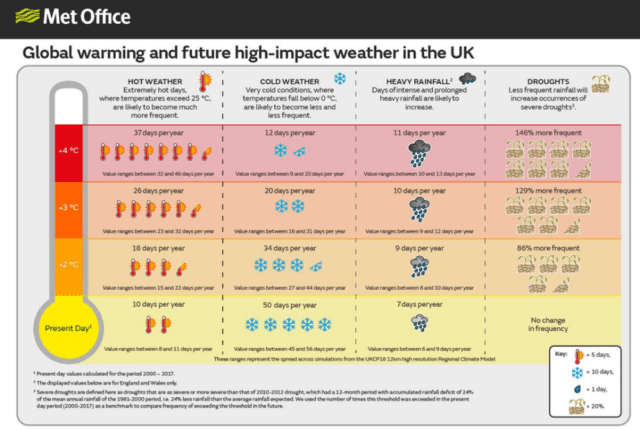A notable climatic transformation is presently unfolding in the United Kingdom. It is one that carries remarkable implications for the nation’s meteorological landscape and, consequently, its socio-economic stability.
According to the Met Office, the most recent ten-year span from 2009 to 2018 witnessed a 1% increase in average rainfall levels in comparison to the period from 1981 to 2010. Additionally, this decade was 5% wetter than the period spanning from 1961 to 1990 across the entire United Kingdom.
While this report indicates that the UK has seen a consistent uptrend in rainfall over the past few decades, there have been noticeable annual variations, especially in more recent times. Specifically, the most recent State of the UK Climate report reveals the period from 2011 to 2020 recorded a significant 9% rise in precipitation compared to the years from 1961 to 1990.
The consequences of these changing rainfall patterns are profound.
In a scenario where global temperatures rise by 4 degrees Celsius, the number of UK households at significant risk of flooding is projected to more than double, reaching 1.9 million by the year 2050.
Additionally, the volume of rainfall on exceptionally rainy days has surged by 17% when examining these same time intervals.

Source: Climateleeds
Projections indicate an increase in the number of days with high-impact rainfall events in the UK. At a 1.5°C level of warming, there will be at least one additional such day per year, and this number could rise to eight additional days per year with a 4.0°C level of global warming.
How Global Warming is Contributing to This Change
The impact of global warming on the UK’s rainfall patterns is becoming increasingly evident. Over the past few decades, there has been a significant rise in temperatures, approximately one degree Celsius since the 1950s.
The UK Climate Projections (UKCP), which is a set of tools and data that shows you how the UK climate may change in the future, indicate a concerning trend for the future, suggesting that, under a high emissions situation, the UK could witness a shift towards more winter rainfall and reduced summer rainfall.
This shift is further evident in the data reported by the Met Office showing 17 record-breaking rainfall months or seasons since 1910, 9 of which occurred after 2000.
The urgency of addressing this issue became starkly apparent in July 2021 when Western Europe experienced extreme rainfall, resulting in devastating flooding, over 200 fatalities, and extensive infrastructure damage, notably in Germany and the Benelux countries.
On the other side of the spectrum, periods of the year that are typically dry may become even drier, placing additional stress on water resources. This situation is exacerbated by the fact that climate change is expected to reduce the amount of water available for sustainable extraction from the environment, while simultaneously increasing the demand for irrigation during the driest months.
What Role Do Human Activities Play?
Human activities are playing a significant role in driving changes in rainfall patterns within the UK. Despite efforts to reduce greenhouse gas emissions, data from the UK Department for Business, Energy & Industrial Strategy reveals that emissions remained substantial as of 2019.
Studies suggest that climate change increased the likelihood of the record-breaking UK summer temperatures in 2018 by about 30 times compared to what would occur naturally.
Extreme heavy rainfall events, like the unprecedented rainfall observed on October 3, 2020, which would have been a 1-in-300-year event without any impact from human-induced climate change, have now become a 1-in-100-year event in the present climate.
In a recent analysis of extreme rainfall events in Western Europe, researchers have found that these events are becoming more frequent and intense due to human-induced climate change. The analysis revealed that these extreme rainfall events are now more likely to occur than in the past, with a 3% to 19% increase in intensity during the summer season.
Nonetheless, it can be challenging to distinguish the impact of human influence on our long-term rainfall patterns when solely relying on observational records, primarily because the current trends in extreme rainfall fall within the historical range of natural variability.
A study utilizing high-resolution climate models projects that the discernible effects of human-induced climate change on short-duration extreme rainfall patterns in the UK may not become evident until at least the 2040s for winter and the 2080s for summer.
What Should We Expect Going Forward?
Overall, the UK is expected to experience wetter winters and drier summers.
However, the rain that occurs during the summer is likely to become more intense than our current experience.
For instance, rainfall from an event that typically happens once every two years in the summer is projected to increase by approximately 25%. This will have an impact on both the frequency and severity of surface water flooding, especially in urban areas.
Urban areas are facing a rising problem of frequent flash floods. The reason for this is that concrete surfaces lack the ability to absorb rainwater, causing it to have no option but to flow into drainage systems during intense downpours.
This, in turn, overwhelms the sewer systems and gives rise to unexpected flash floods, as was evident in a recent incident of heavy rainfall. During this event, the surplus water led to slippery conditions in the station underpass and the accumulation of water in multiple areas within the town center.
However, it’s important to note that a significant increase in severe flooding is not guaranteed by the end of the century. By substantially reducing greenhouse gas emissions and implementing a combination of natural and man-made defenses, it is possible to alleviate the most adverse effects of future flooding.
Cover Photo by Gonzalo Mendiola: https://www.pexels.com/photo/red-buses-on-street-with-big-ben-behind-17649453/
Found it interesting and would like more in the mail?




